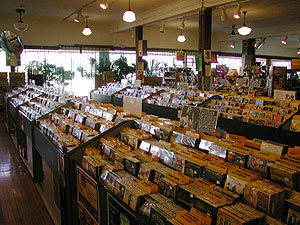| The Independents |
Whither the indie record store?
February 3, 2004
 |
| The Electric Fetus in Minneapolis is widely regarded as the pre-eminent indie record store in Minnesota. It boasts a deep selection of music in nearly every genre. (MPR photo/Chris Roberts) |
St. Paul, Minn. — The Electric Fetus in Minneapolis is widely regarded as the pre-eminent indie record store in Minnesota. The store prides itself on its knowledgeable staff and deep selection of music in nearly every genre.
 | |||
For the Fetus and other record stores, the boom years came when customers were converting their record collections from vinyl to cd, replacing entire catalogs of music. Those days are past but buyer Steve Pearson says business is still healthy.
"We still sell a great deal of catalog and that's basically what we're known for, a large selection of stuff, so we're still doing real well," Pearson says.
Hundreds of indie record stores throughout the country have gone out of business over the years, but The Electric Fetus continues to prosper. Pearson is unfazed by the trend toward downloading music, legal or otherwise. He says downloaders tend to be young and interested in single songs, music he places in the 'here today gone tomorrow' category.
The Electric Fetus, says Pearson, caters to music lovers, and music lovers care deeply about maintaining or enhancing their CD collections.
"They're more into that aspect of it than just downloading a single song," he says. "You know, how do you download a Charlie Parker box set? Things of that nature. You want the liner notes. You want the art work. You know it's a package piece of product that you want where you lose that with the downloading."
Pearson thinks it'll take awhile for digitally delivered music to render places like The Electric Fetus obsolete. He says too many people still love the record store shopping experience, and the Fetus, with its clothing and alternative product lines, has worked hard to become a unique destination. So far, downloading hasn't cut into the store's sales.
"Where we've gotten hurt the most is the burning aspect, is the CD burning," Pearson says. "Cause there's certain genres of music, your R&B, your rap, your heavy metal, things of that nature. You'll get one guy buying it and burning 20 for his friends."
 | |||
Over at Let It Be Records in downtown Minneapolis, owner Ryan Cameron has just re-signed his lease. Business hasn't been horrible he says but it hasn't been great. Cameron says illegal downloading has taken a bite out of sales, and he's also noticed how there are fewer young people walking through his door. He's not sure what kind of impact legal downloading will have.
Let It Be specializes in underground dance and rock music and its walls are lined with old vinyl. While Cameron espouses an old school philosophy about record buyers and their habits, his store is definitely web savvy. Let It Be regularly holds on line auctions to sell its vinyl material. It's also joined a national association of independent record stores which is developing its own online music store.
"It's just another way for us to offer music to those people," Cameron says. "It's like I don't wanna shop there because I'm gonna download stuff from I-tunes or Walmart or whatever the case may be. Well, we offer the same thing. Whether or not that's how I would choose to buy music or how the majority of our customers would choose to buy music....at least we're offering it."
Cameron admits the future of indie record stores is uncertain. But he says his hopes were lifted after a recent meeting with several people in the music industry he trusts, mainly distributors and record label people. He says there were only two things they all agreed on.
"They thought that the business of the record industry would probably go down for the next couple years or at least level off, but never really increase much," Cameron says. "But on the other hand they all agreed that there would always be a place for stores like us."
In the eyes of digital consultant Paul Stark, that prediction is dead wrong. Stark says that's because in two decades, the cd will have gone the way of the recordable wax cylinder.
"I would argue that there will be no physical media 20 years from now," he says. "And because of that you won't need a physical store. The only stores around 20 years from now will be antique stores."
Stark is co-founder of the now defunct Twin Tone Records in Minneapolis, once home to such groups as The Replacements, The Jayhawks, and Soul Asylum.
In 1997, Twin Tone became one of the first labels to make its entire catalog available on line. Stark is now a consultant to the entertainment industry on computer security and encryption issues. He says the indie record stores which have carved out a niche will last the longest but none will survive the digital revolution. How long do they have? Stark says interestingly, it depends on what happens with video.
"When you can get any movie that was ever made at any time at your home by just pushing a button, that's when you also get the same thing with music," he says. "Until then, nobody's gonna spend the money to develop it. All the money's in video. No one's gonna pay $39 a month to have access to all the music in the world. But they will pay $39 a month to have access to all the movies ever made. And to tack on, for three or four dollars, all the music ever made, to your $39 charge, is a reasonable thing."
Stark says indie record stores function as tastemakers and storehouses of information, and he doesn't know what will replace them. As for the experience of actually buying a physical product and enjoying everything that comes with a CD, including the liner notes and the images.
"I guess I see the home of the future with flat screens wherever you want them, and portable, and on that flat screen can be anything you want," Stark says. "They'll have the liner notes they'll have the images. While you're listening to music you could see full video of the group performing that, or something that they want to present to you. I don't even see that as an issue."
If independent record stores are nearing extinction, you can see signs of the beginning of the end at Down In The Valley.
It's a small record store chain with four locations in the western suburbs of the Twin Cities. Managing Director and head buyer Chris Wester says Down In The Valley has been fiercely independent since it opened in 1972. However, Wester says years of illegal downloading, cd burning and lowball pricing by big box retailers have taken a toll. It's been forced to diversify its business, adopting several new lines of alternative clothing products, books, and video games.
"Actually my volume in all those other lines has, for the first time in 2003, actually surpassed my cd volume," Wester says.
Wester says he would like to think there's a place for a store like Down In The Valley in a swiftly changing technological world, but he can also see the end coming.
"The future....it seems finite anyway," he says. "And we're going to stay committed until the end obviously, but you know, what can you do?"
|
News Headlines
|
Related Subjects
|

